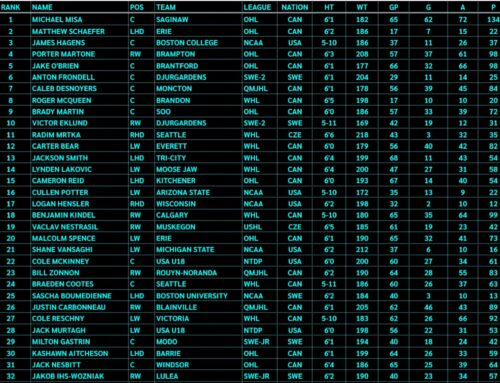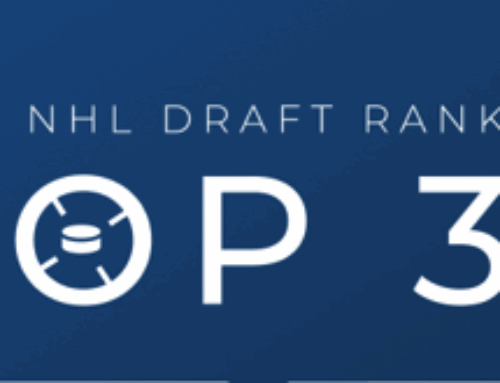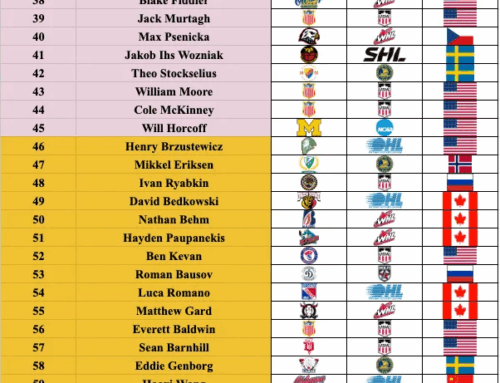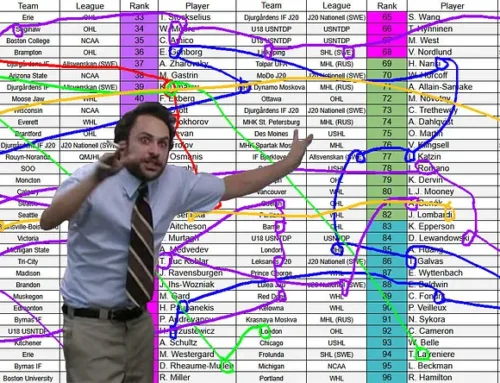2020 WJC Recap: Top Performers
Jokke Nevalainen
2020-01-06
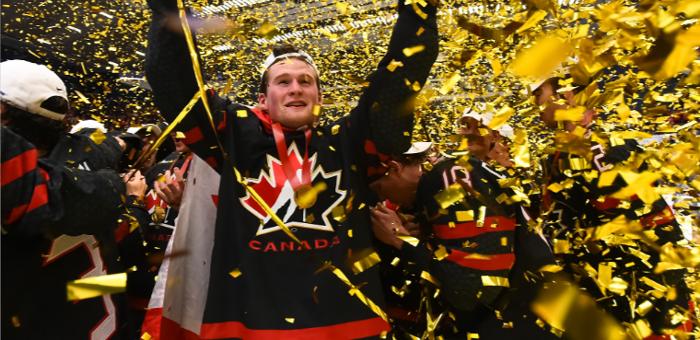
The 2020 IIHF World Junior Championship tournament is now over. Canada got the gold, leaving Russia to take home the silver, and Sweden got the bronze. It was an entertaining 11 days of great hockey action, and I was lucky enough to be able to watch 25 out of the 31 games played in that tournament. These players were the top performers.
Forwards
Swedish winger Samuel Fagemo (LAK) led the tournament in goals, points and shots on goal. The second round pick from the 2019 draft had eight goals, 13 points and 41 shots on goal in seven games. He was also deservedly chosen to the All-Star team by media because he had a great tournament. No one else in the tournament had more than six goals or 31 shots on goal.
But it was Canadian winger Alexis Lafrenière (2020) who took home all the important awards. The projected first overall pick in next summer’s draft was chosen to the All-Star team, he was chosen as the Best Forward by IIHF Directorate, and he won the MVP award voted by media. Lafrenière had four goals and ten points but because he missed two games with an injury, his points-per-game average was slightly better than Fagemo’s.
The third forward chosen to the All-Star team was Canadian center Barrett Hayton (ARZ). The fourth overall pick in 2018 had six goals and 12 points, both being good enough for second in the tournament behind only Fagemo. Five of Hayton’s six goals were scored on the power play, and he scored those six goals on just 18 shots on goal. Hayton was clearly hurt in the final game but still managed to score a goal on the power play.
Swedish winger Nils Höglander (VAN) finished third in the tournament with 11 points, two points behind his linemate Fagemo. Five of those points were goals. If it wasn’t for his ejection from the quarterfinal game against Russia, this second round pick from the 2019 draft could have won the scoring race and maybe earn a spot on the All-Star team.
Grigori Denisenko (FLA), Dylan Cozens (BUF), Kristian Tanus and Trevor Zegras (ANA) had nine points each. Denisenko, the 15th overall selection in 2018, won the scoring race a year ago with those same nine points but this year, there was more competition at the top of the scoring race, so he finished sixth. Zegras, the ninth overall pick in 2019, got his points in five games whereas the others played all seven games. I wonder if this performance was enough for Tanus to get drafted next summer – he’s gone through the draft twice already.
Dominik Bokk (CAR), Patrik Puistola (CAR), Alexander Khovanov (MIN) and Nikita Alexandrov (STL) had eight points each. Bokk, the first round pick in 2018 who was traded from St. Louis to Carolina in September, led the German team in points, and even though he got some of those points in their three-game relegation round against Kazakhstan, he had a great tournament nonetheless.
Defensemen
Swedish defenseman Rasmus Sandin (TOR) took home all the awards here. He led all defensemen in points with 10, and that was good enough for fifth among all players. The first round pick from 2018 was chosen to the All-Star team, and IIHF Directorate chose him as the Best Defenseman. Sweden had an excellent blue line but Sandin led that group in average ice time with 20:39 per game. There was no real debate about him being the top defenseman in this tournament.
Russian defenseman Alexander Romanov (MTL) earned the second spot on the All-Star team. The second round pick from 2018 had one goal and six points while averaging 20:48 of ice time per game. Romanov, the Best Defenseman in last year’s tournament, showed his great skating ability and got involved both offensively and physically, making a number of very noticeable hits throughout the tournament. He also turns 20 years old today, so happy birthday to him.
But there were plenty of good options for the second spot on the All-Star team. Another Russian defenseman, Yegor Zamula (PHI), was actually chosen as a top three player among their team ahead of Romanov. Zamula also played bigger minutes than Romanov, averaging 22:23 per game. Zamula and Romanov were the only two Russian defensemen who were regularly used on the power play. Romanov’s unit started as the number one unit but it was actually Zamula’s unit that finished the tournament as their top option. Zamula had two goals and five points, putting himself firmly on the map among top defense prospects in the world right now. It’s incredible that he went undrafted in 2018 and the Flyers had the foresight to sign him as a free agent the following fall.
Canadian defenseman Calen Addison (PIT) finished second among defensemen with nine points. The second round pick from 2018 only averaged 16:53 per game but he was an important part of Canada’s top power play unit that was so effective in this tournament. Considering all the other options Canada could have used there, it was a nice feather to Addison’s cap.
Swedish defensemen Nils Lundkvist (NYR) and Victor Söderström (ARZ) also deserved consideration. Lundkvist, a first round pick from 2018, was second among Swedish defensemen both in points and average ice time, finishing the tournament with one goal and eight points while averaging 20:23 of ice time per game. Lundkvist’s eight points were also good enough for third in the tournament among defensemen. That is an impressive performance considering he was dragged down by Adam Ginning (PHI) who was his partner at even strength all tournament long. But at least Lundkvist got to play with Sandin on the top power play unit.
Söderström, the 11th overall selection in 2019, got to play with Sandin at even strength and was also used on Sweden’s second power play unit. He finished with one goal and six points while averaging 19:39 of ice time per game. On a very strong group of defenders, Sandin, Lundkvist and Söderström really stood out. Söderström is eligible to return to the tournament next year whereas Sandin, Romanov, Zamula, Addison and Lundkvist all age out – but it wouldn’t be shocking if Söderström was already playing in Arizona this time next year.
And then there’s Moritz Seider (DET) who led the tournament in average ice time by almost two minutes, finishing with an average of 25:20 per game. The sixth overall pick in 2019 also had six points (all assists) – only one player on the German team had more points than him. If Seider played on one of the top teams, it’s easy to think he could have won the Best Defenseman award because he was a beast in each and every game he played. But because his team ended up in the relegation round, it’s hard to really consider him for any of the top honors. Seider played a huge part in Germany avoiding relegation, though, so if he’s still available next year, he can try to carry his team to an even better performance then – but it’s very likely he’s busy playing in the NHL at that point.
Goalies
This tournament was supposed to be a tournament of goalies with big names like Spencer Knight (FLA), Yaroslav Askarov (2020), Justus Annunen (COL), Lukas Dostal (ANA) and Hugo Alnefelt (TBL) all playing for one of the tournament favorites.
Knight, the 13th overall selection in 2019, has had a great NCAA season. Askarov, a projected top ten pick in next summer’s draft, has been playing against men as a 17-year-old, and is arguably the best goalie prospect since Carey Price. Annunen, a third round pick in 2018, has had an amazing season in Liiga. Dostal, who was also a third round pick in 2018, has also had a very good season in Liiga and he was a top goalie in this tournament already a year ago. And Alnefelt, a third round pick in 2019, backstopped the Swedes to their first-ever gold medal at the U18 level in the spring, and has been rising quickly with a strong performance in the SHL this season.
But Askarov struggled right out the gate, and then Knight and Dostal were eliminated at the quarterfinal stage. For a while, it looked like the Best Goalie choice would come down to Annunen vs Alnefelt. But then those two struggled in a couple of games as well, allowing a lesser-known Canadian Joel Hofer (STL), a fourth round pick in 2018, to jump right in and steal the awards – he was chosen as the Best Goalie by IIHF Directorate and also got a spot on the All-Star team.
Coming into the tournament, no one really knew who would be Canada’s number one goalie. Hofer and Olivier Rodrigue (EDM), a second round pick in 2018, were the two NHL affiliated prospects on the roster but it was actually undrafted Nico Daws who got the job early on. But after that ugly 0-6 loss to Russia early in the tournament, Canada turned to Hofer and never looked back.
Hofer’s 0.939 save percentage led the tournament, followed by Alnefelt (0.924), Amir Miftakhov (0.919), Annunen (0.916) and Knight (0.913). Canada and Russia did a good job suppressing shots in front of Hofer and Miftakhov, allowing only about 26 shots per 60 minutes while they were in net. As a comparison, Finland’s Annunen had to face almost 32 shots. Sweden’s Alnefelt had about 28 and USA’s Knight about 29 shots per 60 minutes.
*
And that’s all for now, thanks for reading. Remember to follow me on Twitter @JokkeNevalainen.
Main picture courtesy of IIHF.com



